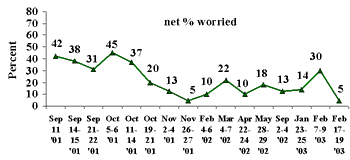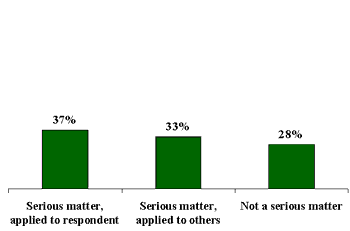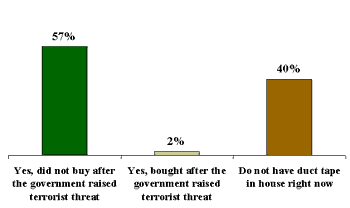GALLUP NEWS SERVICE
PRINCETON, NJ -- When the Bush administration announced on Friday, Feb. 7 that it was raising the terrorist threat designation to "orange," meaning it had determined there was a high risk of terrorist attacks, a Gallup Poll conducted that weekend recorded a sharp increase in fear among Americans about their own security. Now, in a poll conducted just 10 days later, Gallup finds this concern plunging to a relatively low level not seen for over a year.
According to the most recent CNN/USA Today/Gallup poll, conducted Feb. 17-19, 36% of Americans are either "very" or "somewhat" worried that they or someone in their family will become a victim of a terrorist attack. One-third say they are "not too" worried and almost as many (31%) say they are "not at all" worried. Subtracting the percentage not at all worried from the percentage very or somewhat worried yields a "net worried" figure of just 5 percentage points. In the survey earlier in February, Gallup found 48% of the public to be very or somewhat worried and 18% not at all worried, producing a "net worried" figure of 30 points. Net worry stood at 14 points in late January.
Public concern about terrorism has not been as high or low as either of these February readings since the fall of 2001. At that time, the public's initial alarm following the Sept. 11 terrorist attacks, and the subsequent anthrax scare, was followed by relative calm in November. Concern peaked at 45% net worried in early October 2001, but by late November this had fallen to 5% net worried.
| Public Concern About Terrorism (% "very/somewhat worried" minus % "not at all worried") |
 |
Consistent with the mid-February finding that 36% of Americans were either very or somewhat worried that an act of terrorism could affect them personally, a separate Gallup question found that 37% believed the "orange" threat warning was a serious matter that applied to them and their family. Another third believed it was a serious matter, but did not apply to them personally. A third group, 28%, perceived it as not a serious matter. (The fact that well over half of Americans do not believe the terrorism alert applies to them personally may suggest that the alert system is not as effective as the government would like it to be.)
| Terrorist Threat Level Raised to Orange: Serious Matter for You and Your Family? |
 |
| Feb. 17-19, 2003 |
The Worry Gap
Both of these questions probing Americans' sense of personal safety from terrorism show that women are far more personally concerned about the risk of terrorism than are men -- a gender gap evident in relation to this issue since Sept. 11. In the latest survey, 47% of women, compared to just 24% of men, report that they are very or somewhat worried about themselves or someone in their family becoming a victim of terrorism. Similarly, 46% of women vs. 28% of men thought the latest alert applied to them personally.
By contrast, Gallup sees at most minor generational, partisan, and regional differences in fear of terrorism. And despite the fact that the Sept. 11 targets were in major cities, Americans living in rural and suburban areas of the United States are just as likely as those in urban areas to say they are personally worried about becoming a victim.
Duct Tape Tales
Shortly after issuing the orange alert, the Bush administration on Feb. 11 released a set of guidelines for how the public could prepare for a possible terrorist attack. Along with the usual disaster recommendations concerning food, water, and battery supplies, these guidelines made the potentially alarming suggestion that people keep a supply of duct tape and plastic sheeting on hand to seal off windows in the event of a chemical or biological attack.
Despite anecdotal reports that duct tape was cleared out of Home Depot in some areas, Gallup's latest survey indicates that very few Americans acted upon the suggestion. Only 2% of national adults admit to having purchased duct tape as a result of the government's terrorist warning. Part of the reason for the low figure is that a majority of Americans (57%) already had duct tape in their homes. But a sizeable 40% of Americans remain without duct tape.
| Do You Have Duct Tape in Your House Right Now? |
 |
| Feb. 17-19, 2003 |
While it might seem reasonable to assume that, because the government advisory was issued, there would be a high correlation between being fearful about terrorism and having duct tape in the home, the data do not bear this out. This is because men -- who are generally less fearful of terrorism than women are -- tend to be more likely than women to say they have duct tape. As a result, only 34% of Americans with duct tape at home, compared to 39% of those with no duct tape, are very or somewhat worried about becoming a victim of terrorism.
The media has had something of a field day with the duct tape issue -- ranging from a New York Times article reviewing the history of duct tape to in-depth reporting about the public's response to the government's duct tape recommendation, to borderline ridicule of it. At the same time, some have suggested that the media have overplayed the terrorism situation, including the use by cable news networks of a constant "bug" on the screen reminding viewers that the country is in a "high" or "orange" state of alert. Still, through all of this, Americans have been fairly satisfied with the way the news media have reported recent threats of terrorism. Fifty-seven percent of Americans, including a majority of both Republicans and Democrats, believe the news media have acted responsibly in their handling of the threats; only 40% say they have acted irresponsibly.
Survey Methods
These results are based on telephone interviews with a randomly selected national sample of 1,002 adults, 18 years and older, conducted Feb. 17-19, 2003. For results based on this sample, one can say with 95 percent confidence that the maximum error attributable to sampling and other random effects is ±3 percentage points. In addition to sampling error, question wording and practical difficulties in conducting surveys can introduce error or bias into the findings of public opinion polls.
How worried are you that you or someone in your family will become a victim of terrorism -- very worried, somewhat worried, not too worried, or not worried at all?
|
|
Some- |
|
Not |
KNOW A VICTIM (vol.) |
|
||
|
% |
% |
% |
% |
% |
% |
||
|
2003 Feb 17-19 |
8 |
28 |
33 |
31 |
* |
-- |
|
|
2003 Feb 7-9 ^ |
13 |
35 |
34 |
18 |
* |
* |
|
|
2003 Jan 23-25 |
8 |
31 |
36 |
25 |
-- |
* |
|
|
2002 Sep 2-4 |
8 |
30 |
37 |
25 |
* |
* |
|
|
2002 May 28-29 |
9 |
31 |
37 |
22 |
1 |
* |
|
|
2002 Apr 22-24 |
8 |
27 |
39 |
25 |
1 |
* |
|
|
2002 Mar 4-7 |
12 |
33 |
32 |
23 |
* |
* |
|
|
2002 Feb 4-6 ^ |
8 |
27 |
39 |
25 |
-- |
1 |
|
|
2001 Nov 26-27 |
8 |
27 |
34 |
30 |
1 |
* |
|
|
2001 Nov 2-4 |
11 |
28 |
34 |
26 |
-- |
1 |
|
|
2001 Oct 19-21 † |
13 |
30 |
33 |
23 |
* |
1 |
|
|
2001 Oct 11-14 † |
18 |
33 |
35 |
14 |
* |
* |
|
|
2001 Oct 5-6 † |
24 |
35 |
27 |
14 |
* |
* |
|
|
2001 Sep 21-22 † |
14 |
35 |
32 |
18 |
* |
1 |
|
|
2001 Sep 14-15 † |
18 |
33 |
35 |
13 |
* |
1 |
|
|
2001 Sep 11 † ‡ |
23 |
35 |
24 |
16 |
1 |
1 |
|
|
2000 Apr 7-9 ^ |
4 |
20 |
41 |
34 |
-- |
1 |
|
|
1998 Aug 20 ‡ ? |
10 |
22 |
38 |
29 |
-- |
1 |
|
|
1996 Jul 20-21 ‡ |
13 |
26 |
34 |
27 |
-- |
* |
|
|
1996 Apr 9-10 ? |
13 |
22 |
33 |
32 |
-- |
* |
|
|
1995 Apr 21-23 ? |
14 |
28 |
33 |
24 |
-- |
1 |
|
|
* |
Less than 0.5% |
||||||
|
(vol.) Volunteered response |
|||||||
|
^ |
Asked of a half sample |
||||||
|
† |
WORDING: How worried are you that you or someone in your family will become a victim of a terrorist attack -- very worried, somewhat worried, not too worried, or not worried at all? |
||||||
|
‡ |
Based on one night poll of national adults with a margin of error of ±4 pct. pts. |
||||||
|
? |
WORDING: How worried are you that someone in your family will become a victim of a terrorist attack similar to the bombing in Oklahoma City? |
||||||
|
? |
WORDING: How worried are you that you or someone in your family will become a victim of a terrorist attack similar to the bombing in Oklahoma City? |
||||||
Overall, do you feel the news media have acted responsibly or irresponsibly in handling the recent threats of terrorism in the United States?
|
Responsibly |
Irresponsibly |
No opinion |
|
|
2003 Feb 17-19 |
57% |
40 |
3 |
When the government raised the terrorist threat level to high, or "orange," just over a week ago, which of the following best described your reaction -- [ROTATED: you thought it was a serious matter that applied to you and your family, you thought it was a serious matter that applied to other people but not to you, personally, or you did not think it was a serious matter]?
|
Serious matter, applied to respondent |
Serious matter, applied to others |
Not a |
|
|
|
2003 Feb 17-19 |
37% |
33 |
28 |
2 |
Do you have any duct tape in your house right now, or not?
Did you go to the store and buy duct tape after the government raised the terrorist threat just over a week ago, or not?
COMBINED RESPONSES (Q.28-29)
|
2003 Feb 17-19 |
||
|
% |
||
|
Have duct tape in house right now |
59 |
|
|
(Bought duct tape after the government raised terrorist threat) |
(2) |
|
|
(Did not buy duct tape after the government raised terrorist threat) |
(57) |
|
|
Do not have duct tape in house right now |
40 |
|
|
No opinion |
1 |
|
